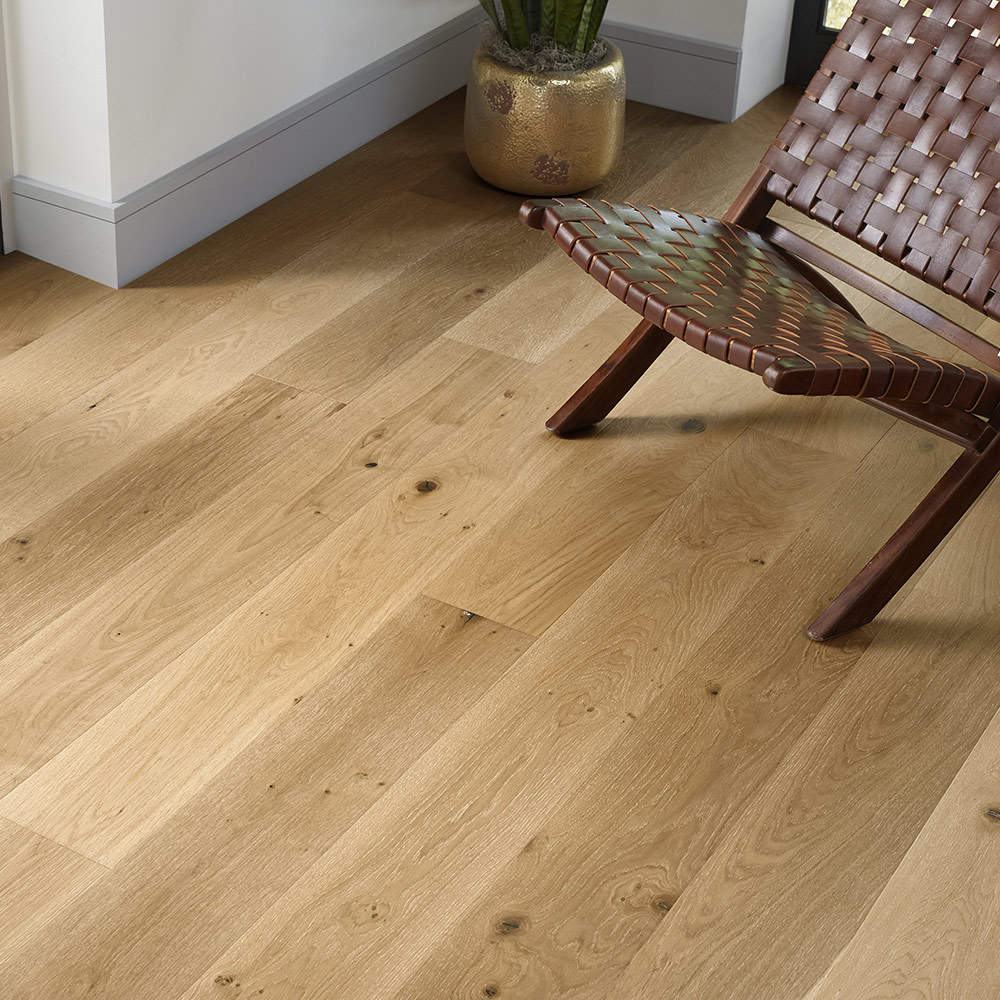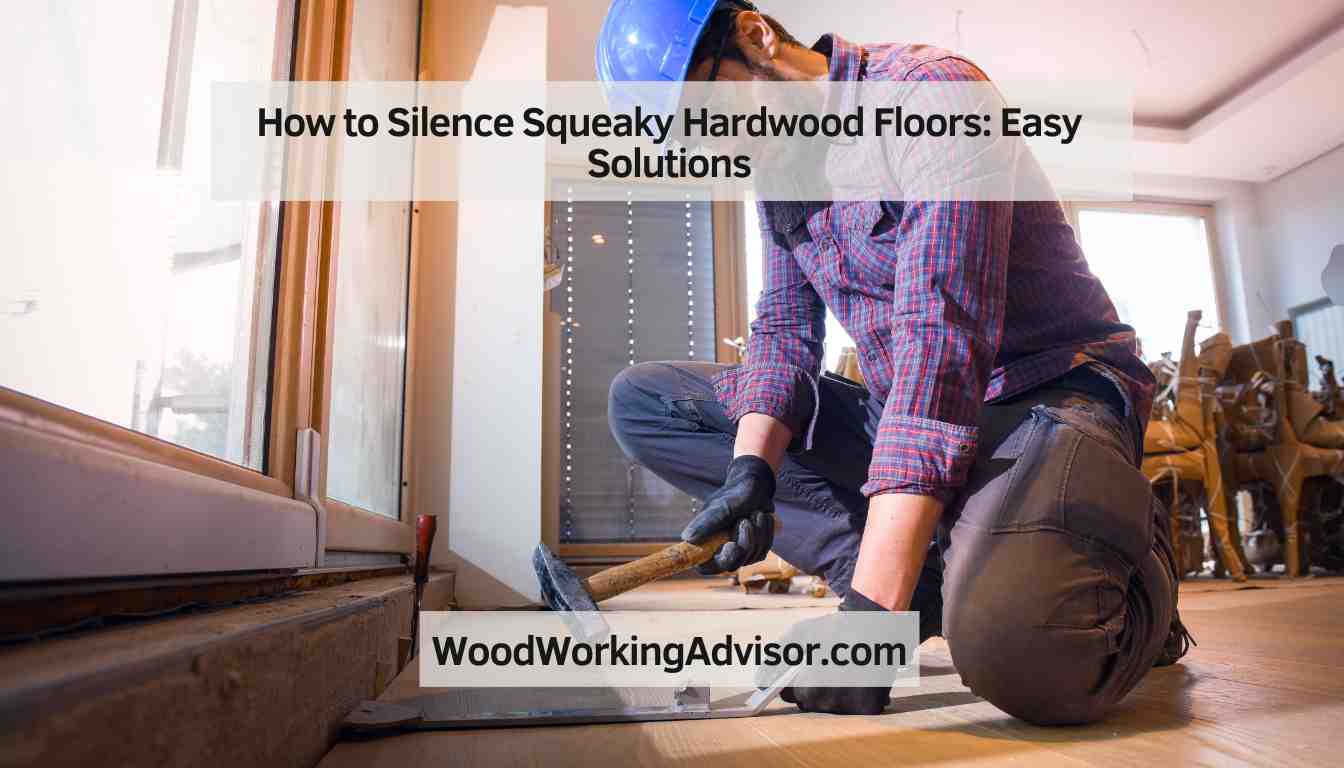To make hardwood floors stop squeaking, try inserting shims between the subfloor and joists. Another option is using talcum powder to reduce friction between floorboards.
Hardwood floors are a timeless and elegant flooring choice for many homes, but annoying squeaks can detract from their beauty and functionality. Whether you have refurbished an older house or installed new hardwood floors, dealing with squeaking can be frustrating.
We will explore effective methods to silence those pesky squeaks and restore the peace and quiet in your home. By following simple steps and using common household items, you can enjoy a creak-free environment and maintain the charm of your hardwood floors for years to come.
Identifying The Cause Of Squeaky Floors
When trying to make your hardwood floors stop squeaking, the first step is to accurately identify the cause of the issue. By understanding what is causing the squeaks, you can then take the necessary steps to address them effectively.
Loose Floorboards
One of the common reasons for squeaky floors is loose floorboards. If the floorboards are not securely fastened to the subfloor, they can rub against each other, creating the squeaking noise. Examine the floorboards carefully to identify any areas where they may be loose or shifting, as these are the areas that need to be fixed. Use screws or nails to secure the loose floorboards, and ensure they are properly attached to the subfloor to eliminate the squeaks.
Humidity And Temperature Changes
Changes in humidity and temperature can also cause hardwood floors to squeak. Wood is a natural material that can expand and contract in response to changes in humidity levels. When the wood absorbs moisture or dries out, it can lead to gaps between the floorboards, causing them to rub against each other and produce squeaking sounds. Maintaining a consistent humidity level in your home can help prevent this issue. Use a humidifier in dry conditions and a dehumidifier in humid conditions to keep the moisture levels stable and reduce the likelihood of squeaky floors.
Fixing Squeaks With Simple Solutions
Living with squeaky hardwood floors can be downright annoying. Fortunately, there are simple solutions you can try to silence those squeaks without the need for professional help.
Using Talcum Powder Or Baby Powder
Talcum powder or baby powder can work wonders in eliminating squeaks. Sprinkle it generously over the squeaky area, allowing it to seep into the gaps. Use a soft brush to work the powder into the cracks for better results.
Applying Lubricants
Lubricants such as graphite powder or silicone spray can help silence squeaky hardwood floors. Apply the lubricant along the seams of the floorboards where the squeaks are originating from. Wipe off any excess to avoid a slippery surface.
Advanced Techniques For Squeaky Floors
Hardwood floors are a timeless and elegant feature in any home. However, as they age, they may start to develop squeaks and creaks, which can be quite frustrating. While basic methods like using talcum powder or lubricating the boards can help temporarily, advanced techniques are often necessary to address the root causes of the problem. Here are some advanced techniques that can effectively help you tackle squeaky hardwood floors.
Using Squeak-relief Brackets
Squeak-relief brackets are a powerful solution for eliminating squeaks in hardwood floors. These brackets are designed to be installed from above the floor, reaching down through the carpet, hardwood, or other flooring materials to secure the subfloor tightly to the joist. They can effectively silence squeaks and prevent future ones, providing a long-term solution to the problem.
Reinforcing The Subfloor
Sometimes, squeaks in hardwood floors can be attributed to a weak or damaged subfloor. Reinforcing the subfloor using methods such as adding new plywood, adhesive, or screws can help strengthen the structural integrity of the floor, reducing or even eliminating the squeaking. This approach addresses the underlying issue and ensures a durable, long-lasting fix.
By utilizing these advanced techniques, you can effectively address squeaky hardwood floors and restore peace and tranquility to your home.

Credit: www.homedepot.com
Preventive Measures To Avoid Squeaks
If you have hardwood floors in your home, you know how frustrating it can be when they start to squeak. Not only can it disrupt the peaceful atmosphere of your living space, but it can also be a nuisance that you want to get rid of as soon as possible. The good news is that there are preventive measures you can take to stop your hardwood floors from squeaking in the first place. By following these simple steps, you can ensure a quiet, squeak-free environment in your home.
Proper Installation And Fastening
One of the main reasons why hardwood floors start to squeak is improper installation or fastening. When the floorboards are not installed correctly or securely fastened, they can rub against each other, causing squeaking noises. To prevent this issue, it’s essential to ensure that your hardwood floors are installed and fastened properly. This can involve hiring a professional installer who has the expertise and experience to do the job correctly.
Proper installation includes aligning the floorboards correctly, so there are no gaps or unevenness. It also involves using the right type and length of nails or fasteners to secure the floorboards to the subfloor. By paying attention to these details during the installation process, you can significantly reduce the likelihood of squeaky floors in the future.
Controlling Indoor Humidity
In addition to proper installation, controlling indoor humidity is another important preventive measure to avoid squeaky hardwood floors. Changes in humidity levels can cause wood to expand and contract, leading to squeaking noises as the floorboards move against each other. To maintain a stable indoor environment, it’s crucial to keep the humidity levels consistent.
One way to control indoor humidity is by using a humidifier or dehumidifier, depending on your specific needs. A humidifier adds moisture to the air during dry seasons, preventing the wood from drying out and shrinking. On the other hand, a dehumidifier helps reduce moisture during humid seasons, preventing the wood from absorbing excess moisture and expanding. By keeping the humidity levels within the recommended range of around 35-55%, you can minimize the chances of your hardwood floors squeaking.
Additionally, it’s vital to avoid excessive exposure to water or liquid spills on your hardwood floors. Water can seep into the wood, causing it to swell and potentially lead to squeaks. Clean up spills promptly and ensure that your floors are well protected from water sources such as leaking pipes or pet accidents.
Calling In The Professionals
While DIY methods can be effective in fixing squeaky hardwood floors, there may come a time when these solutions fail to provide a lasting solution. When you find yourself in this situation, it may be time to seek expert advice and call in the professionals.
When Diy Methods Fail
DIY solutions such as using talcum powder or lubricating the squeaky areas with WD-40 can work well in many cases. However, there are instances where the squeaks persist despite your best efforts. This could be due to underlying issues like loose subflooring, damaged floorboards, or inadequate installation. In such situations, it is best to consult professionals who have the knowledge and experience to identify and address the root cause of the problem.
If you have tried various DIY methods, but the squeaking in your hardwood floors persists, it’s time to consider seeking expert advice.
Seeking Expert Advice
When it comes to hardwood floor repairs, consulting a professional is often the most reliable and efficient option. These experts have the experience and tools needed to properly diagnose and fix the issue. By seeking expert advice, you can avoid wasting time and money on ineffective DIY attempts.
Professional hardwood floor repair services offer a range of solutions tailored to your specific needs. They will assess the condition of your floors and determine the best course of action to eliminate the squeaking. This may involve reinforcing the subflooring, replacing damaged floorboards, or securing loose nails.
Furthermore, relying on professionals guarantees a higher quality of work and a longer-lasting solution. They have access to specialized equipment, ensuring the repairs are done with precision and care. Additionally, professionals often provide warranties on their work, giving you peace of mind knowing that any future issues will be addressed.
Overall, calling in the professionals for your squeaky hardwood floors is a wise choice. Not only do they possess the expertise needed to diagnose and fix the problem, but they also provide lasting solutions, saving you time and effort in the long run.

Credit: m.youtube.com
Frequently Asked Questions For How To Make Hardwood Floors Stop Squeaking
How Do You Fix A Squeaky Hardwood Floor?
To fix a squeaky hardwood floor, locate the source of the noise. Sprinkle talcum powder, wood shims, or lubricant into the floor joints. Then, secure the floorboards with screws.
Why Does My Wood Floor Squeak When I Walk On It?
Wood floor squeaks when you walk due to loose boards or subfloor issues causing friction. Proper repair or installation can resolve squeaking.
What Is The Best Lubricant For Squeaky Wood Floors?
The best lubricant for squeaky wood floors is powdered graphite or silicone spray. Apply directly to the joints for optimal results.
How Do You Walk On Squeaky Floors Without Making Noise?
To walk on squeaky floors quietly, try sprinkling baby powder or talcum powder in the gaps. Press down firmly when walking to reduce noise. Use rugs or carpets to muffle sounds. Tighten loose floorboards with screws. Apply WD-40 between creaky boards to lubricate and silence them.
Conclusion
By following these simple steps, you can effectively make your hardwood floors stop squeaking. With the use of common household items and basic maintenance, you can enjoy a quieter and more peaceful living space. Say goodbye to those annoying squeaks and revel in the tranquility of your silent hardwood floors.


